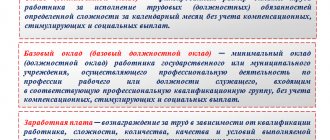From the article you will learn how to prove illegal wages in court, what evidence you need to collect for this, and whether it is realistic to defend your rights in this situation.
Often, an employee is faced with the fact that the employer does not formalize an employment relationship with him, or formalizes, but does not specify in the employment contract, the full amount of wages. To be fair, it must be said that the second option is more common. Such registration is beneficial to the employer and may negatively affect the rights of the employee.
Occurrence of a problem
Wages, as the law says, are a set of payments due to an employee for his work. Its size is determined by many factors, ranging from government requirements to the views of the employer.
The law requires you to pay your earnings twice a month. First the advance, and then the salary. For a number of reasons, the practice of unofficially paying a significant portion of this amount has become widespread among employers.
All this is called “salary in an envelope.”
It’s worse when an employment relationship is not formalized with the employee at all, and all payments are completely processed through “black” accounting. This further complicates the worker's situation.
Forms of remuneration
What types of salaries are practiced? “White” is paid in full, all required contributions to the budget and insurance funds are made from it.
“Black” wages can pass through, in whole or in part, through unofficial accounting.
Evasion is associated, first of all, with the desire to save on the tax burden and contributions to social and pension insurance. This approach also provides additional leverage on employees. People are forced to put up with illegal demands, in particular, to work overtime without additional payments, and endure other violations of their rights.
Because of this situation in the private sector of the economy, people prefer to get a job in budgetary organizations. There, of course, a small salary is offered, but without the risks described above and the worries associated with them.
United front
The essence of the claims.
Tax officials, as was already the case regarding salaries, do not live in proud but not very productive isolation, but together with colleagues from the labor inspectorate, exchange information with funds. It is beneficial for them if labor inspectors prove a violation: more personal income tax and contributions will flow into the budget. The tax authorities themselves do not have the right to punish for violations of the Labor Code of the Russian Federation.
Inspections cooperate with departments of all regions, participate in general meetings, including via video link. For example, if labor inspectors of the Tomsk region suspect “envelope” schemes involving shift workers from Buryatia, but their colleagues do not have enough evidence, the scheme is investigated jointly. There was a case when inspectors from six regions interrogated employees of a Moscow company to prove salary fraud.
How to avoid.
Check whether the company faces a non-tax audit in the coming year at genproc.gov.ru - “Summary inspection plan”. If departments have planned an audit, be prepared that after the controllers, tax officials may come to the company. Therefore, prepare information for inspectors in advance. For example, it is safer to explain why employees switched to contract agreements or why the company stopped paying bonuses to employees.
Consequences of concealing income affecting the employee
Sometimes they simply refuse to hire an employee in compliance with the law. By insisting on refusing to formalize the relationship or offering partial registration (half-time while actually working full time), the employer tries to show the positive side of the situation in that payroll is hidden from the state.
Perhaps the only dubious advantage for an employee is savings on taxes and social contributions. Some men use this to get rid of paying alimony or reduce its amount.
But “salary in an envelope” carries serious negative consequences:
- The funded part of the pension or the pension itself is lost (more on this below).
- Minimum payments during maternity leave or unemployment.
- Reduced amount or complete absence of payments due to illness.
- Lack of entries in the work book confirming periods of employment (affects the chances of employment for a similar position in another company).
- The risk of losing compensation payments due to staff reduction or dismissal.
If income is partially hidden, then the employee loses part of the benefits; if income is completely hidden, there is a risk of being left without government support altogether. Thus, even a small salary is not the best compromise.
How to prove payment of “gray” wages
Russian case management provides that the burden of proof in court lies with the person who puts forward a certain thesis. Thus, in order to win legal proceedings against the employer, the employee will be required, personally or through his representative, to provide the court with information confirming that he received an unofficial part of the salary, while the employer can simply show the court official salary documents.
There is no list of comprehensive evidence regarding unofficial wages, therefore, the greater the number of different complex evidence collected by the plaintiff, the higher the likelihood of the court making a decision in his favor, however, it cannot be guaranteed, since it is not provided for by the relevant laws and legislative acts. Examples, but not an exhaustive list of evidence of unofficial salaries, include:
- Unofficial statement of the enterprise. If during an audit by the tax inspectorate the fact of the existence of an additional salary statement is recorded, they can act as evidence in court. However, in any case, the statement should not be the only evidence; it should contain the signature of officials or the seal of the enterprise, or the signatures of other employees. If the documents do not contain details of employees, their signatures, settlement information and signatures of the director or accountant, it will not be taken into account by the court. The same applies to the case if such a statement was received in violation of established procedural norms, that is, not during an audit by the tax inspectorate, but in some other way.
- Protocols of interrogations of employees. Taken together with the existence of other evidence, the interrogation records of several individual employees may be considered a valid basis for deciding the existence of unofficial wage payments. However, if the testimony is contradictory, if a minority of workers reported the presence of “gray” earnings in the results of interrogations. Interrogation protocols not drawn up in the proper form are also not taken into account by the courts.
- Enterprise vacancies. Advertisements in the printed press or on the Internet, where vacancies indicate wages that differ significantly from the actual ones, may be taken into account by the court as evidence of the presence of “gray” payments. However, printouts of advertisements on the Internet must be notarized, or the plaintiff will be required to ensure that the judge is familiar with them online through a petition in the courtroom.
- Certificate of income in form 2-NDFL. Sometimes, at the request of employees, employers reflect the amount of real wages in a person’s income certificate, which can also be taken into account by the court.
- Indirect evidence may be audio and video recording of wage payments in envelopes, pay slips provided by the employer, signed envelopes, the average salary in the region for similar positions, the employee’s withdrawal of large sums from banking institutions, the acquisition of expensive property that does not correspond to his official income and other facts.
An important fact is that audio recording and video recording must necessarily comply with legal requirements. Thus, an audio recording cannot include information related to personal life, and video recording implies recording either exclusively the contact between the employer or its responsible person and a direct employee, or the consent of all other persons recorded on it in writing.
The danger of “black wages” for future retirees
Until 2013, everyone counted on a guaranteed pension from the state; the length of work experience and the amount of salary did not matter. Since that year, everything has changed. And not right away.
Having reached the required age (55 years for women and 60 years for men), citizens will be able to receive a pension with a certain number of years of work behind them. For example, in 2017, 8 years of experience are required; from 2024, at least 15 years of experience will be required.
Otherwise, you will have to wait another 5 years to become eligible for a social pension or continue to work to accumulate the missing number of points. This is what “black” wages threaten citizens approaching retirement age.
How to return unofficial wages in court?
If the letter has no effect on the employer, then you will have to go to court to protect your own rights. How to get black wages upon dismissal by applying to the judiciary?
The first step is to make a written statement. The appeal can be made in any form. It should mention all violations committed by the employer. It is important not to forget to indicate the organization’s contact information and address.
Dear readers! To solve your problem right now, get a free consultation
— contact the on-duty lawyer in the online chat on the right or call:
+7
— Moscow and region.
+7
— St. Petersburg and region.
8
- Other regions of the Russian Federation
You will not need to waste your time and nerves
- an experienced lawyer will take care of solving all your problems!
What does the employer face?
Receipt of information about the use of “gray” schemes at an enterprise entails an audit by the tax inspectorate. The labor inspectorate, representatives of the Social Insurance Fund and the Pension Fund of the Russian Federation, and the prosecutor's office can join it.
In this regard, the following types of employer liability are provided:
- administrative;
- criminal;
- tax office
They are also held accountable for evading payment of insurance premiums.
As a general rule, arrears and penalties are collected, and fines are added to them. At the same time, they can be imposed on officials and a legal entity. Their size ranges from 5 to 40 thousand rubles.
The minimum fine for criminal prosecution is 100 thousand rubles.
If an enterprise practices wages that are not provided for by law, all this can lead to serious consequences.
What punishment does the employer face?
By not paying wage taxes, an entrepreneur is breaking the law. If the fact of unofficial payment of labor is discovered, the company will receive an audit from the tax office, which will determine the amount of arrears and establish penalties for the fact that the taxes accrued to it were not paid on time.
Since in the situation under consideration there was a failure to pay insurance premiums, an appropriate audit will be carried out and the company will have to pay in full not only what it owes, but also significant administrative fines.
They can relate to both the company and the officials who work in it.
Are workers held accountable?
The media and employers express the opinion that both employers and employees are being prosecuted for non-payment of contributions and taxes. Is it so?
According to current legislation, tax and other accruals on wages with their further transfer to the appropriate funds are the responsibility of the employer. It is he who bears all the responsibility, not the employee.
Benefit for the employer
The employer's interest lies in the following:
- a significant reduction in tax payments, the implementation of which is assigned to the employer. Contributions to social security and the Pension Fund of the Russian Federation are set as a percentage of employee pay; accordingly, the lower the salary, the lower the tax amount;
- increasing profits due to savings on deductions;
- an additional way to influence workers. In the event of any conflict of interests, an unregistered employee can simply be kicked out, fined and deprived of earnings.
This method of employment violates the interests of employees, as well as labor legislation. At the same time, it is extremely difficult, and sometimes completely impossible, to prove such an employment relationship.
How to protect your rights
But what is the point of knowing how an employer might suffer?
The employee will sooner or later understand that a salary in an envelope only creates problems for him. The first thought that comes to mind is to run to court, especially since the filing period is only 3 months from the date of non-payment of money. However, this step is premature; evidence needs to be collected; allegations about “black” wages alone are not enough.
The court considers cases on the basis of materials received from the parties to the process. Unfortunately, workers bring only a few witnesses to the proceedings. How to prove “black” wages in court? What is necessary?
The Code of Civil Procedure requires that certain circumstances be proven only in a manner established by law. This means that if there has been a violation of the labor law, the employee must provide materials from the labor inspectorate, the Federal Tax Service, the Pension Fund and the Social Insurance Fund, or the prosecutor’s office. Only by having answers from them that prove the fact of a violation, there is a chance to achieve a positive result.
Signs of “grayness”
As the Federal Tax Service in the Kostroma region said, tax authorities are conducting a campaign to combat wage shadowing if:
— the salary of employees of a particular activity is stated to be significantly lower than the average level for the region or for a similar industry;
— according to documents, employees in management positions receive less money than employees of ordinary rank;- an employee of an organization, in order to obtain a loan, indicated in bank documents a salary level that is not the one listed in the tax reports for his organization;
— an employee has received a complaint, appeal, call or letter regarding the payment of a gray or black salary.
Contacting the Federal Tax Service and other regulatory authorities
Where to contact:
- Federal Tax Service;
- Social Insurance Fund;
- Pension Fund;
- State Labor Inspectorate.
The listed structures operate according to a single scheme. Having received an application from a citizen, they order either a desk inspection or an on-site inspection. A desk audit is carried out on the basis of documents previously received from the organization.
An on-site inspection is carried out by a team of employees of the inspection body or several bodies. An order is issued and a date is set.
During the verification process the following is carried out:
- inspection of the employer's premises;
- seizure of documentation;
- interviewing witnesses (enterprise employees);
- requesting additional documentation.
An act is drawn up based on the results of the inspection, an order is issued to eliminate violations, collection is carried out, in particular, funds are written off from accounts without a judicial procedure, and property is seized.
The Federal Tax Service is concerned about tax evasion, the Social Insurance Fund and the Pension Fund are concerned about evasion of insurance premiums.
What should you do if you don’t pay unpaid wages to your company’s employees? Contact each of the regulatory authorities with a statement. And also note in the header of each application where a similar document was sent. This way, an unscrupulous entrepreneur has less chance of having complaints ignored.
Benefits and risks for the employee
Often employers simply refuse to employ citizens on official grounds. Many applicants are strongly advised to refuse legal registration or are offered to hide the actual amount of their salary. Without hiding their own interest, employers try to describe all the positive aspects of illegal employment.
Such cooperation has, although dubious, advantages:
- the amount of pay without deducting taxes increases;
- the amount of alimony obligations is reduced.
For some citizens, this type of work is preferable to an official arrangement. These include persons who have debts on loans or alimony, as well as utility bills.
Even if the court makes a decision to collect debts against such employees, the bailiffs have little chance of achieving results, since all black payments are usually made in person, without the involvement of banking authorities.
However, in pursuit of illusory benefits, many applicants do not take into account the obvious disadvantages of unofficial registration. The law does not establish worker responsibility for illegal work, and such workers punish themselves. They lose:
- the opportunity to receive a decent pension benefit due to the lack of contributions and length of service;
- the right to large maternity and unemployment payments;
- the ability to protect oneself in accordance with labor law;
- paid sick leave;
- the opportunity to obtain a mortgage or other loan;
- the right to compensation upon dismissal or layoff.
If salaries are partially hidden, employees lose only part of the benefits they are entitled to. Black wages can deprive them of support completely.
Complaint to the prosecutor's office
The prosecutor's office is responsible for general supervision of the activities of government bodies and organizations. What does it mean? The agency does not replace these bodies, in particular, the Federal Tax Service and other structures. The prosecutor's office accepts complaints about the inaction or illegal actions of the listed bodies.
A submitted application with attached documents stating that a small salary is being paid illegally is sent to the labor inspectorate. Other authorities will not even notify what is happening. The prosecutor's office will oblige the inspectorate to provide a report on the results of checking the application. So, first of all, you need to report violations to the relevant organizations, and then, if they are inactive, write a complaint to the prosecutors.
It should be noted that there are employees who organize inspections with the involvement of relevant departments, conduct a full-scale inspection and issue a conclusion based on the materials received.
The collected materials are then used to file a lawsuit to protect the workers.
Working at a disadvantage
The essence of the claims.
Loss is bad. This is very bad. This is an almost ready-made “scheme”. Because, according to the inspectors, there simply cannot be losses for any other reason. The company shows losses because it hides income; in fact, it has a stable financial position, and officially it only pays part of the salary to employees - to save money.
How to avoid.
Both preventive and ongoing measures will help. A loss-making declaration should be submitted immediately with an explanatory note. Tax officials recommend justifying why the loss arose and explaining when the company plans to get out of the crisis. Support your arguments with documents - provide rent and utility bills, loan agreements.
Warn employees (drivers, loaders, supply managers - everyone) that tax officials may call them in for questioning due to the company's losses. It’s not a panacea, of course; they can say too much anyway. Unexpected not only for the employer, but also for themselves. A typical example: a loader was called. They asked about this, they asked about that. How are your wife and children? How is the company doing? And he, warned, suddenly took it and said that, probably, things are not very good in the company, since they give out salaries “in cash”. And he didn’t think that these words of his were not words at all, but “testimony.” They recorded it, and then they took on the general director and the chief accountant. The manager admitted that he was issuing gray salaries from the company’s shadow income. A curtain.
In general, so that the employee does not cause harm with answers, it is safer to send the company’s lawyer, if one is available, to the Federal Tax Service together with him. You have no right to refuse. Not walking at all is not an option.
What evidence can the employee provide?
It makes sense to contact a regulatory organization with evidence in hand. At the same time, the question is raised: how to prove illegal wages in court?
The extent of the evidence available depends on whether formal employment took place or not, and what position the applicant held.
In the absence of official records in the work book or a written contract, the fact of the employment relationship must also be proven. Sample list of evidence:
- employee testimony;
- witness statements from the organization's clients and other citizens who can confirm the execution of orders or work;
- provision of receipts, invoices, and other documents confirming the fact of the plaintiff’s activities;
- audio, video recordings;
- correspondence materials via electronic mail services (mail.ru, for example);
- recordings of telephone conversations;
- advertisements in the media and on the Internet about the availability of vacancies.
When posting a vacancy on the Internet, the applicant is forced to post the organization’s data or his personal data in the case of an individual entrepreneur.
The easiest way in this situation is for office workers who have access to documentation.
A separate category is court decisions on claims of the Federal Tax Service, Social Insurance Fund, and Pension Fund for the collection of contributions from an organization. If such claims have been filed, the chances of workers defending their rights are significantly increased.
They don’t pay unofficial salary - what to do?
Unofficial employment, payment in an envelope - all this can lead to the main problem - the inability to influence the authorities who are delaying wages. The second common problem is non-payment of payroll at the time of dismissal. And the last one is the most common.
Thus, the reader has already understood that gray wages are outside the scope of the law and the legal relations between employer and employee are not respected. Therefore, management may refuse to pay wages. If a problematic situation arises, it will be difficult to prove receipt of a salary and, in general, the fact of having a job. However, many are not stopped by possible problems with a successful proposal.
There are several methods to resolve the issue:
- A conversation with management, during which, if there are good personal relationships, you can change the situation for the better and the gray salary will still be paid.
- Insist on official employment, in accordance with the norms of the Labor Code of Russia.
- Submitting information about salary payments in envelopes to the court.
It is the third approach that will be effective, but it will also require a lot of effort. So, before filing a claim, you need to arm yourself with recording devices, a video camera, etc. Come to a personal conversation with your boss and record the entire conversation. However, it must address the topic of remuneration. In the future, this will be irrefutable evidence of evasion in the payment of taxes, contributions, etc.
Filing a claim
The claim is filed in the magistrate's or district court, depending on the amount of the debt (the magistrate's court hears cases worth up to 50 thousand rubles).
The claim states:
- name of the court or magistrate's court;
- information about the plaintiff (full name and address, telephone number);
- name of the organization or data of the individual entrepreneur - the defendant;
- third parties (Federal Tax Service, Social Insurance Fund, Pension Fund), illegal payroll directly affects their interests;
- a statement of the circumstances and evidence available to the applicant;
- requirements for the defendant;
- list of attached documents;
- signature and date of filing the claim.
The claim scheme is standard: date of employment, time worked at the time of filing the case, the conditions under which the plaintiff was hired.
If it is still clear how to prove illegal wages in court, then what requests should be sent to the court?
- establish the fact of labor relations (if there was no official registration);
- oblige to accrue and pay wages in the amount of (indicate the amount);
- recover moral damages in the amount (the amount is indicated in the claim with its justification);
- additionally accrue or accrue to the Federal Tax Service, Social Insurance Fund, Pension Fund contributions from wages during the period (specify in the claim) insurance premiums in the amount of (specify amount);
- make an entry in the work book about acceptance to the position ... (name indicated);
- make a record of dismissal in the work book for a reason (which the employee considers correct, but taking into account the wording of the law).
It should be noted that labor disputes in court are not paid by the plaintiff with state fees. It is collected after the process is completed from the losing side.
How to force an employer to pay
With informal hiring, a situation is possible when the manager simply does not pay the money earned by the employee. Considering that the employment contract has not been drawn up, the employee cannot actually demand anything from him.
However, it can do the following:
- If you simply talk to the employer and appeal to his honesty, then, although this is unlikely, it is still possible that he will meet you halfway. It may be that non-payment is determined by his difficult business situation and he will pay his employee later. However, in most cases you should not count on this.
- Threaten to contact regulatory authorities. In case of inspections, the entrepreneur will have to bear the responsibility associated with the payment of black wages.
- Go to court to officially recognize the fact of hiring and non-payment of wages. In this case, the employee’s position will be stronger, the more convincing his evidence is.
Having the appropriate court decision in hand, you can receive the due compensation. However, it is impossible to know in advance what the court will decide. In such cases, he will make a decision that is consistent with the evidence presented.








